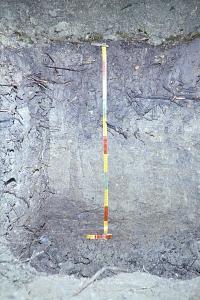Reference soil France 04: Vertisol
Vertisols occur dominantly in level landscapes under climates with a pronounced dry season. Vast areas are found in Australia, India, northeastern Africa (Sudan, Ethiopia), southern Latin America and the USA.
Characteristics
Soils having a vertic horizon (a clayey subsurface horizon with polished and grooved ped surfaces ("slickensides") or wedge-shaped or parallelepiped structural aggregates) within 100 cm from the soil surface. They have 30 percent or more clay in all horizons to a depth of 100 cm or more, or to a contrasting layer (lithic or paralithic contact, petrocalcic, petroduric or petrogypsic horizons, sedimentary discontinuity, etc.) between 50 and 100 cm, after the upper 20 cm have been mixed. In addition, Vertisols exhibit wide cracks, which open and close periodically.
Reference soil FR004: Vertisols
CRUSTING: crusty surface, top 2 cm highly organic. TEXTURE: Clay is heavy throughout. BRIEF CHARACTERIZATION OF THE SOIL: A thin clayey profile, dark-coloured with organic matter to a depth of 35 cm and with streaks of dark-coloured organic matter on ped surfaces down to a depth of 70 cm. Fragments of limestone and free lime removed to a depth of 25 cm. The clay is calcareous below 45 cm. Cracks reach down to 55 cm. ADDITIONAL NOTES ON PROFILE DESCRIPTION: AC - also very dark grey (10YR3/1). - with horizontal layer of fragmented limestone, 1 cm thick. C1 - vertical structural planes evident, slickensides. C3 - with dusky red (2.5YR3/2) streaks. - crystalline lime crust (secondary lime) of 1 cm thickness at 115 cm. - with depth changing into weathered limestone.
